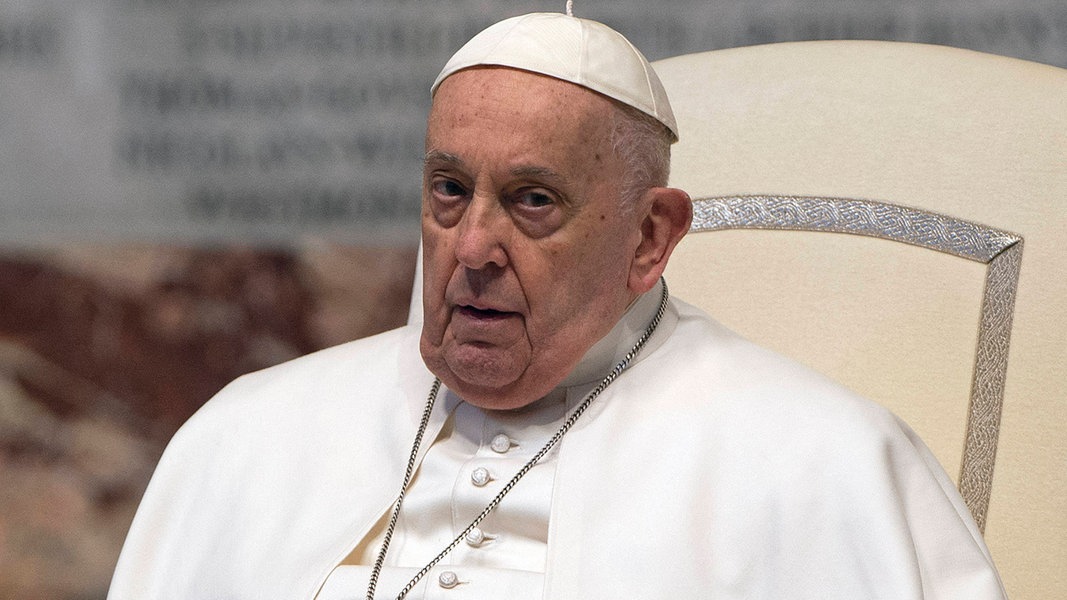As of: March 11, 2024 3:00 p.m
In an interview, Pope Francis, when asked about the war in Ukraine, spoke of a “white flag” that should be raised and the courage to negotiate. Did the Pope advise Ukraine to capitulate?
A conversation with Florian Breitmeier from the Religion and Society editorial team.
When did the Pope gave the interview. And what exactly did he say?
Florian Breitmeier: He gave the interview to the Swiss broadcaster RSI at the beginning of February, which is the part for the Italian-speaking part of Switzerland. With regard to the war in Ukraine, Francis was asked whether he stood with those who called for Ukraine to be given up because Russia could not be repelled, or whether the Pope stood with those who said Ukraine would be given up legitimize the action of the strongest side. The Swiss television interviewer himself brought up the term “white flag” with a view to this task.
The Pope replied that it was a matter of interpretation, but he was convinced that the strongest person is the one who looks at a situation, then thinks about the people, has the courage to raise the white flag and is also willing to negotiate. Francis then added: When you see that you are defeated, that things are not going well, you have to have the courage to negotiate. Francis also made it clear in the interview that for him “negotiating” does not mean “surrender”.
Further information
8 Min
Ukrainian President Zelensky has sharply rejected Pope Francis’ appeal for peace negotiations with Russia. 8 mins
So is this just the result of a somewhat unfortunate wording? This has already happened many times with Francis.
Breitmeier: At least Vatican diplomacy is now trying to twist the Pope’s words in retrospect in order to emphasize that the Pope was actually interested in the negotiations that he wanted in this conflict. However, his statements – when a weaker person saw that he could not win – could be interpreted as meaning that he was referring to Ukraine and not Russia. He did not clearly state that Russia is the aggressor in this war. He also did not clearly address Putin’s side in having the courage to withdraw troops from Ukraine, for example, but rather he stuck to the perspective of Ukraine, which should negotiate. This is at best a misleading formulation, but not one that is likely to happen to a Pope as a diplomatic head of state in the 21st century.
It is not surprising that a pope speaks fundamentally about peace. But he has always stood on the side of the oppressed and has also courageously stood up against dictatorships, for example in his home country of Argentina. So what are we experiencing right now?
Breitmeier: I think this is the great struggle of a pope in a conflict that the world public is also facing and is actually asking itself what will happen next in Ukraine. The dying is happening there, but the solution cannot be to raise the white flag and let Russia have its way. Of course a pope cannot demand Taurus cruise missiles, but as an influential head of state – and that is the pope – he should not diplomatically outline solutions that are as complex as what happened in this interview. Strictly speaking, it also contradicts Christian morality if one does not stand on the side of a weak person in a specific situation, if one is not prepared to strongly condemn violence and to oppose it resolutely, to promote and work for a just peace, but it is more than just a fragile truce. Here the Pope should have formulated it more clearly and differentiated more than he did.
Further information
7 Min
Pope Francis is receiving a lot of criticism after his comments on the war between Ukraine and Russia. 7 mins
How does the church react to this interview?
Breitmeier: Very shy. The German Bishops’ Conference was asked how it assessed these statements by the Pope. It was said that there was nothing further to add to the words of Vatican spokesman Matteo Bruni, who had made the point very strongly that the Pope was interested in negotiating and not in capitulating. The German Bishops’ Conference could have imagined more, especially because they presented a paper on peacekeeping and peace ethics at their spring general assembly in Augsburg at the end of February, which also clearly stated that there is a legitimate right to self-defense and in the event of violence Counter-violence can also be used. Because it cannot lead to one completely capitulating to an attacker; the right to self-defense is also enshrined in Christian ethics.
The interview conducted Julia Westlake.
This topic in the program:
NDR Culture | Journal conversation | Mar 11, 2024 | 4:15 p.m
